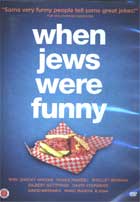
When Jews Were Funny 2013
Distributed by First Run Features, 630 Ninth Avenue, Suite 1213, New York, NY 10036; 212-243-0600
Produced by Sudden Storm Entertainment; Jesse Ikeman; Jeff Glickman
Directed by Alan Zweig
DVD, color, 89 min.
Sr. High - General Adult
Jews, Humor
Date Entered: 05/21/2014
Reviewed by Sheila Intner, Professor Emerita, Graduate School of Library & Information Science, Simmons College GSLIS at Mt. Holyoke, South Hadley, MAAdvertised as a survey of Jewish comedy and comedians, When Jews Were Funny is actually not very funny, even though it consists of a series of interview clips with a number of Jewish comedians and includes them telling jokes. The questions asked by the interviewer are sometimes leading—for example, Weren’t all the comedians of their time Jewish?—and—Are Jews still funny today?—seemingly designed to elicit first a “yes” and, then, a “no.” To their credit, the respondents don’t jump to his tune, but try to describe a nuanced history as well as varied thoughts of the future.
Among those with whom Mr. Zweig speaks at some length are Shelly Berman, Norm Crosby, Gilbert Gottfried, Bob Einstein, and David Brenner, who certainly qualify as old Jews who made their living being funny. Younger comedians are also questioned, among them Elon Gold, Judy Gold, and Marc Maron. Brief archival clips of comics in action are interspersed with the interviews and include well-known Jewish comedians such as Shecky Greene, Alan King, Jackie Mason, Rodney Dangerfield, and Henny Youngman. The interviewer is never onscreen—he is heard asking questions, but not seen, which was disconcerting. He asks his subjects if they see themselves as Jewish comedians, if they think Jews changed North American comedy, and if they think Jewish comedy and comedians are now different than they once were. Some of the follow up questions provoke intensely personal responses and reveal the respondents’ and the interviewer’s thoughts. These segments sometimes shed more light on the speakers themselves than on the questions.
Humor, one cannot help but think, has no special ethnicity or religion. As one respondent says, Irish comedians do Irish humor, Italian comedians do Italian humor, Jewish comedians do Jewish humor—what’s so surprising and what’s the issue? And, equally true, as another puts it, funny is funny, whether the performer is Jewish, Irish, Italian, or anything else. Yes, there are Jewish jokes, intended for Jewish audiences, using Yiddish language, and featuring Jewish characters. Yet, David Brenner’s jokes about his parents seem funny in similar ways to those told by Bill Cosby, although Cosby is not mentioned here. And, as Brenner says, “Everything is funny.” On the other hand, several respondents are wistful and say that the “Jewishness” of Jewish comedians has been diluted by the widespread acceptance of Jews and their assimilation into mainstream America.
Is anti-Semitism necessary for Jewish comedians to remain funny? Or, to remain Jewish? Does oppression breed comedy and acceptance stifle it? These seem to be underlying assumptions held by a number of subjects. In this viewer’s opinion, that thesis does not hold up, although some of the film’s respondents disagree. The omission of a framework within which to understand what one sees and hears makes this confusing as a teaching tool.